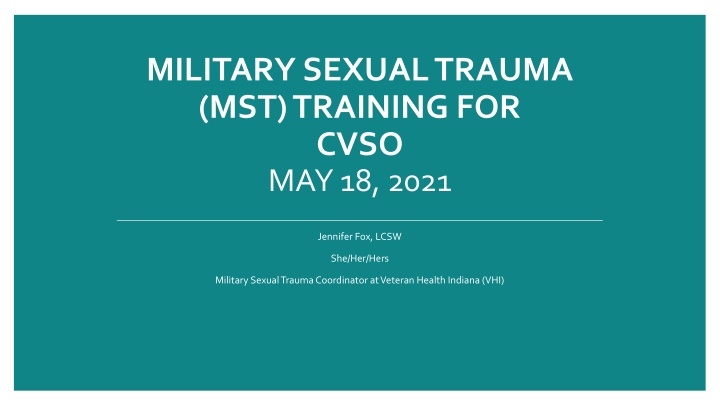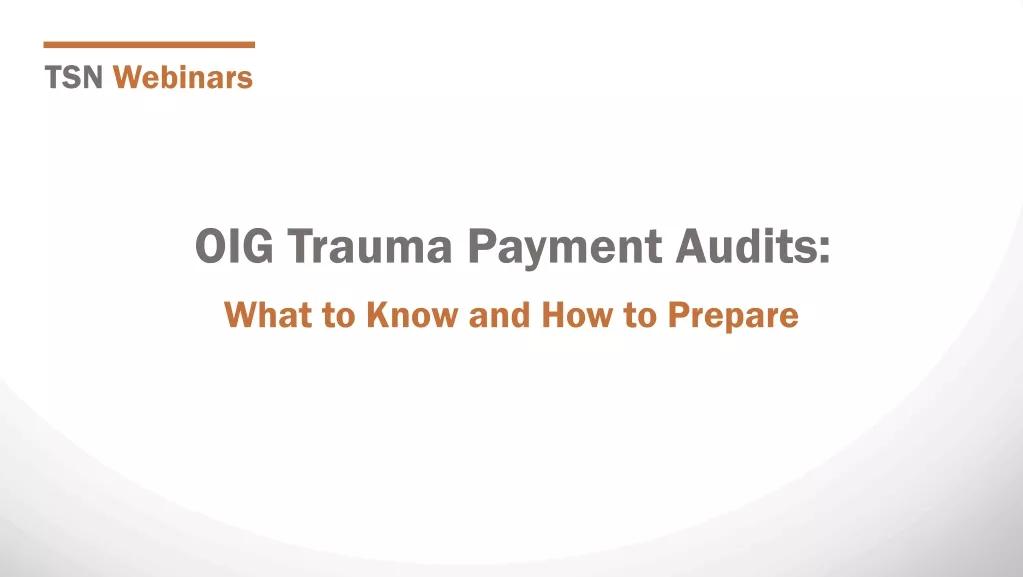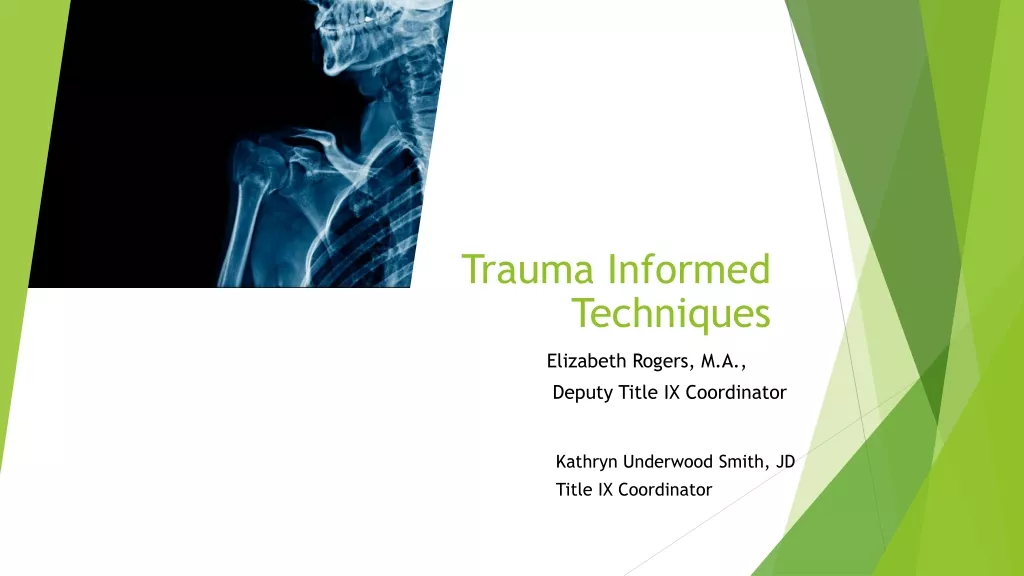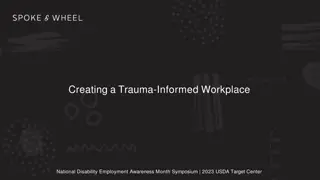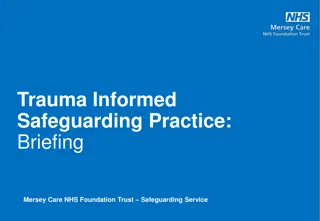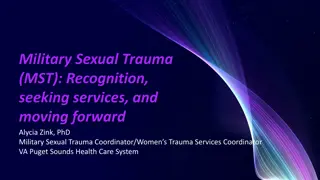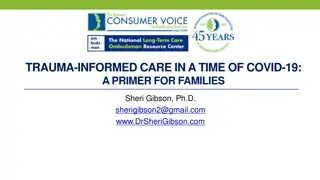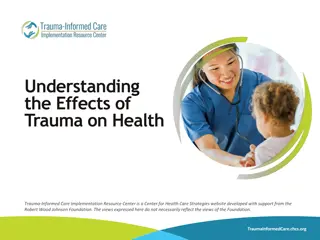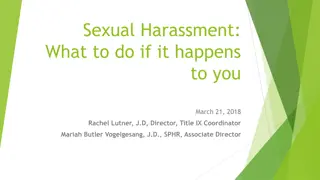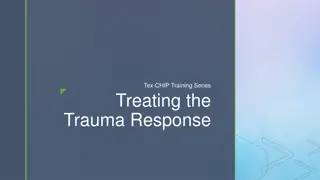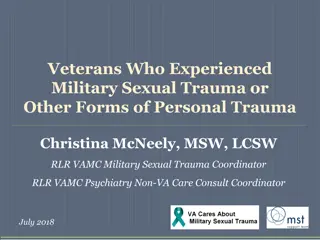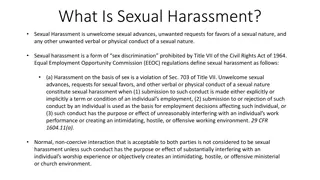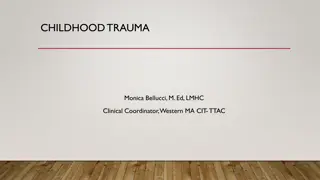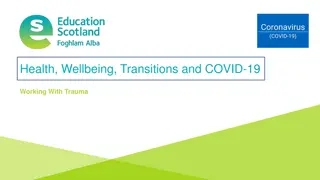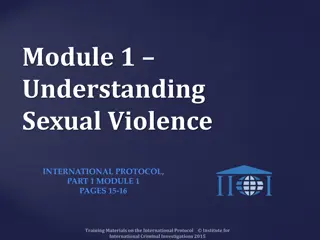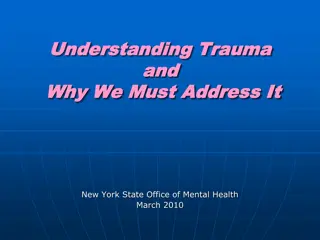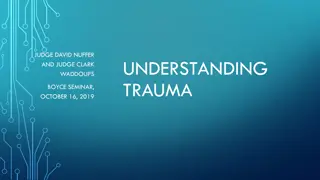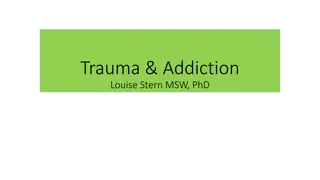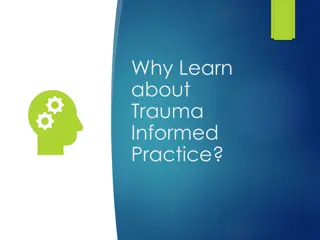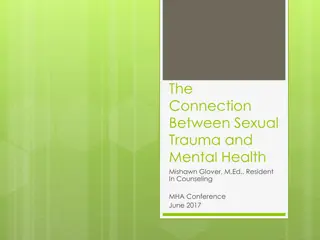Military Sexual Trauma - Key Facts and Approaches
Military Sexual Trauma (MST) refers to experiences of sexual assault or harassment in the military. Learn about MST survivors, the importance of rapport-building with them, and the challenges they face. Understand the impact of MST on individuals and society, and discover strategies for providing support to survivors.
Download Presentation

Please find below an Image/Link to download the presentation.
The content on the website is provided AS IS for your information and personal use only. It may not be sold, licensed, or shared on other websites without obtaining consent from the author.If you encounter any issues during the download, it is possible that the publisher has removed the file from their server.
You are allowed to download the files provided on this website for personal or commercial use, subject to the condition that they are used lawfully. All files are the property of their respective owners.
The content on the website is provided AS IS for your information and personal use only. It may not be sold, licensed, or shared on other websites without obtaining consent from the author.
E N D
Presentation Transcript
MILITARY SEXUAL TRAUMA (MST) TRAINING FOR CVSO MAY 18, 2021 Jennifer Fox, LCSW She/Her/Hers Military Sexual Trauma Coordinator at Veteran Health Indiana (VHI)
Defining Military Sexual Trauma VA uses the term military sexual trauma (MST) to refer to experiences of sexual assault or repeated, threatening sexual harassment experienced while on active duty, active duty for training, or inactive duty training. This includes any experience in which someone is involved in a sexual situation against their will, for example: feeling pressured into sexual activities (for example, with threats of negative consequences for refusing to comply or with implied better treatment in exchange for sexual contact); unable to consent to sexual activities (e.g., intoxicated, sleeping, or lower ranking Compliance does not mean consent); unwanted touching, grabbing; threatening or unwelcome sexual advances; exposure to threatening, offensive remarks about a person's body or sexual activities being physically forced into sexual activities.
What we know about people who experience MST When screened by a VA healthcare provider, about 1 in 3 women and 1 in 50 menreport experiencing MST. While women are more likely to experience MST, there are many more men than women in the military. Thus, over one-third of MST survivors seen in VHA are men. 80% of survivors experienced MST between the ages of 17-24 (Lofgreen 2017) . Yet, survivors are seeking treatment much later with a mean age of 51.1 for men versus 46.1 for women. Women Veterans who identify as lesbian or bisexual reported military sexual assaults at 3.5 times the rate of straight women Veterans. (shipherd 2020) Male Veterans who identify as gay or bisexual reported military sexual assault at 16% vs. 1% in straight male Veterans. (shipherd 2020) Transgender Veterans reported military sexual assault 3 times more than cisgender Veterans. (shipherd 2020) BIPOC (Black, Indigenous, and/or People of Color) Veterans are at higher risk (Lofgreen 2017) and report being targeted because of their racial minority status. (DVA MST Survivor s Voices 2020)
Developing Rapport with MST Survivors Keen awareness of social and cultural factors of MST (obedience to chain of command, organizational needs > individual needs, hypermasculinity, etc.) Validate difficulty of traumatic experience, impact on life Normalize symptoms Offer hope, people can heal after MST Patience Emphasizing choice, power to make own decisions Body language, eye contact, facial expressions, neutral language Use active listening skills reflecting, summarizing Inviting open dialogue about quality of relationship, needed adjustments Monitor own discomfort in addressing MST, seek supervision when needed
Combat trauma Shared trauma Public knowledge No need to report MST Individual trauma Secret/shame/difficult to disclose Often feel conflict: pressure to report or fear of reporting Personal (victim may feel targeted) Not trained for/betrayal of expectation Impersonal Trained for/expected Enemy is to blame Enemy is external Victim is often blamed Enemy is internal often live and work with the perpetrator, or rely on friends of perpetrator Destroys unit trust/bonds-isolation Enemy returns home-at VA medical centers, in community, still vulnerable/afraid Preserves unit trust/bonds Enemy remains overseas Katz, 2016
Considerations for working with Veteran male survivors Social and military norms about experiencing/expressing emotional and/or physical vulnerability. May share living space with their perpetrator, or friends of their perpetrator. Express concern about the sexual assault being documented in charts, therefore visible to other providers. Have fears about not being believed. Report less pride in their veteran status than female survivors of MST, as well as significantly less pride than male patients in treatment for nonsexual traumas. Report higher levels of sexual dysfunction than female survivors
Mental Health symptoms often associated with sexual trauma hopelessness/helplessness shame, guilt dissociative episodes nightmares, flashbacks, intrusive thoughts of the trauma overuse of alcohol/drugs not wanting to talk about the trauma, be around people that remind him/her of the trauma, emotional numbing/distancing crying spells confusion, forgetfulness social withdraw, difficulty trusting irritability, decreased concentration, disrupted sleep, hypervigilance, hyperstartle emotional numbing negative view of self/the world panic attacks disordered eating depressed and/or anxious mood hyper-hypo sexuality Anhedonia (lack of interest/ability to enjoy previously enjoyed activities) suicidal ideation, suicide attempts, self-harm behaviors
Mental health diagnoses often associated with sexual trauma Although MST causes distress in almost everyone exposed to it, not all develop psychiatric disorders. (Suris et al.,2013). PTSD Substance Use Disorder(s) Complex PTSD Eating Disorders (Breyland et al., 2017) Depression Somatization Disorders Anxiety Dissociative Disorders Borderline Personality Disorder Insomnia
Physical health issues often associated with sexual trauma (Suris & Lind 2008; Lofgreen 2017) Resulting from injury during MST or, secondary to chronic tension or circulation of stress hormones, or behavioral attempts to cope with the stress Symptoms may include: Diagnoses may include: headaches, migraines irritable bowel syndrome TMJ, bruxism sexually transmitted infections, including HIV chronic pain unwanted pregnancy dizziness genital injury nausea cardiovascular disease (e.g., myocardial infarction and stroke) weight loss/gain chronic pulmonary disease fatigue liver disease ulcers, gastrointestinal problems genitourinary conditions (e.g., chronic pelvic pain and sexual dysfunction) pelvic pain, menstrual problems sexual dysfunction hypothyroidism
supportive responses when sexual trauma is disclosed I believe you. I m sorry that happened to you. You re not alone. It s not your fault. You are not crazy. Thank you for trusting me enough to share this with me. Examples of what not to say/ask: did you fight back? did you say no? were you with a buddy? what were wearing? why didn t you report it right away? It s not safe for women to be in the military.
VHA MST Coordinators Every VHA facility has an MST Coordinator. Veteran Health Indiana (VHI) includes Richard L. Roudebush VAMC and the following CBOC s: Terre Haute, Bloomington, Martinsville, Shelbyville, West Lafayette, Wakeman (Camp Atterbury), and Indy West. VHI focus of MST Coordinator (.5 FTE) is to educate Veterans and staff about treatment resources, link to treatment providers, assist in overcoming any barriers to care, ensure all MST related policies/metrics are met, & provide education to stakeholders. Veterans can connect with VHI MST Coordinator via phone (317-988-3449)
VBA MST Coordinators Every VBA Region has a female and male MST Coordinator to assist with the VBA claims process. Use the link below for the most up to date contact information for VBA MST Coordinators: https://www.benefits.va.gov/benefits/mstcoordinators.asp As of 5/10/21 points of contact are as follows Kimberlyn Tutt - Female Primary Kimberlyn.Tutt@va.gov Julitta Goodner - Female Alternate Julitta.Goodner@va.gov Gary Benge - Male Primary Gary.Benge@va.gov Dechez Edmonds - Male Alternate Dechez.Edmonds2@va.gov
MST and VBA/C&P Teach that MST is an experience, not a diagnosis and therefore not a SCD; can be SC for DSM diagnoses, +/or physical health condition(s). If needed, request an examiner of a specific gender. Without coaching, prepare them for the types of questions that may be asked (what happened, symptoms noticed during, after, and currently; impact on social, occupational, and educational domains etc.) Encourage survivor to develop (possibly with a MH provider) a self-care plan for days leading up to exam, as well as during and after the C&P exam including receiving results. Validate, listen, educate. Stress outcome of VBA application is not a reflection of whether the examiner/VBA believes MST occurred. Emphasize treatment related to MST may still be available regardless of SCD.
Self-care for helpers Compassion Fatigue, Vicarious Trauma, Secondary Trauma, PTSD Same Physical and Mental Health Symptoms Strategies that work for MST survivors work for us: Exercise Sleep Nutrition Engage with professional and social support systems Mindfulness, quiet time Advocacy/social justice Balance
VA MST Resources Beyond MST app icon image, with two blue mountains with a white path between them and a sunrise in the background. Beyond MST, a self-help mobile app created specifically to support the health and well-being of military sexual trauma survivors. VA MST Website has a broad range of MST related information and resources: https://www.va.gov/health-care/health-needs-conditions/military-sexual-trauma/
References Department of Veteran Affairs MST SharePoint. Survivors Voices [Booklet]. (2020). Washington DC. Katz, S. (2016) What is Military Sexual Trauma? In Katz, (Ed.), Treating Military Sexual Trauma. New York, NY: Springer. Lofgreen A.M., Carroll K.K., Dugan S.A., Karnik N.S. An Overview of Sexual Trauma in the U.S. Military. Focus (Am Psychiatr Publ). 2017 Oct;15(4):411-419. doi: 10.1176/appi.focus.20170024. Epub 2017 Oct 12. PMID: 31975872; PMCID: PMC6519533. Shipherd, J.C., Kauth, M.R. (2020). Assisting LGBT Veterans who Experienced MST: Resources from the LGBT Health Program [PowerPoint slides]. LGBT Health Program, Veterans Health Administration, Washington DC. https://dvagov.sharepoint.com/sites/VHAMST/Resources/Assisting%20LGBT%20Veterans%20who%20Experienced%20MST%20- %20Resources%20from%20the%20LGBT%20Health%20Program Suris,A., & Lind,L. (2008). Military sexual trauma. Trauma, Violence, & Abuse,9(4), 250- 269.https://doi.org/10.1177/1524838008324419
